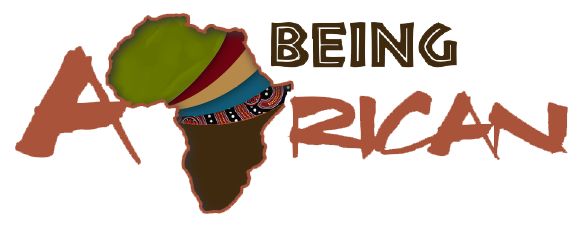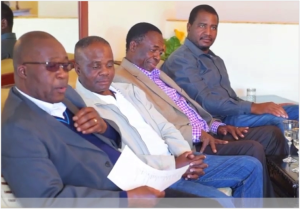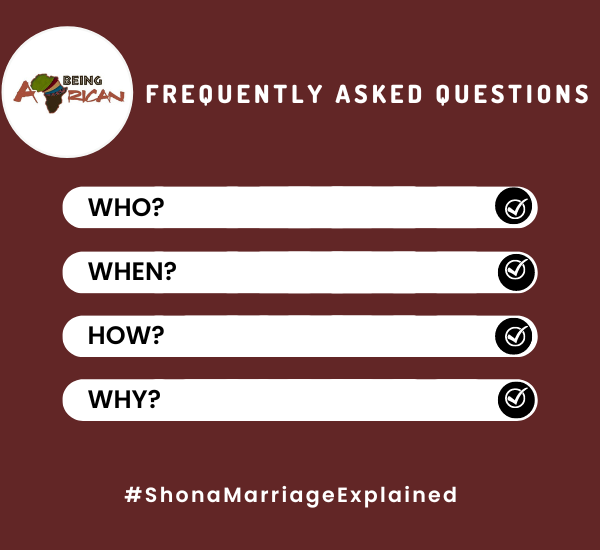
Shona Frequently Asked Questions
Key roles and Roora process explained
Vakwasha-The groom’s team

Munyayi – Intermediary

Who is munyayi?
- Munyayi is the go-between and a spokesperson for the groom’s family
What is munyayi’s role?
- He is responsible for solving any problems or easing tension during bride price negotiations
Who can take the role of munyayi?
- Munyayi can be one of the groom’s uncles can be from immediate or extended family
- A respected member of the community
- A male family friend
Qualities to look for munyayi
- Good temperament
- Excellent communications skills
- Maturity, sensitivity and dependability
- Good sense of humor
- Cultural etiquette
Tete – Vanatete (aunts)

Who is tete-aunt?
- Bride’s paternal aunt(s). Father’s sister(s)
- Groom’s paternal aunt. Father’s sister(s)
- Can also be a female representative from extended family
- Occasionally a family friend may be requested
What is tete’s role on the bride’s side of the family?
- “Spokesperson” for the bride’s family
- Mediator between the two families during the bride price negotiations
- Even though she is the bride’s family member, vatete also acts as an advocate for the groom
- If situations get tense or the prices are way out of range, the groom’s people can take her to the side and explain where they stand, and she can negotiate with the bride’s father(s)
What is tete’s role on the groom’s side of the family?
- Supports and and gives advice to the groom
- Not all families have a tete-aunt accompanying the groom’s team
Shona Roora (lobola) process
Step by step explanation
Step 1
1. Vhuramuromo
What is vhuramuromo?
-
- In the Shona roora process, vhuramuromo means opening one’s mouth to speak
- There is a fee for vhuramuromo
What is the fee for?
-
- The bride’s family require the fee to initiate dialogue. This fee is paid at the beginning of the roora process
- Therefore the groom is asked to pay a token fee to make an official request to speak freely and also to be heard
-
- Remember, at this point the groom is not yet embraced as a family member. The bride’s family is approached with humble submission and respect since gathering these particular elders for roora is highly important
- It is just a sign of respect by the groom. It gives the process decorum and dignity
-
- By accepting the fee the bride’s family agrees to participate in the dialogue
2. Ndiro-Plate
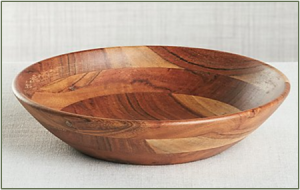
Typically a wooden plate or bowl
What is the ndiro-plate
-
- It is typically a wooden plate or bowl
- can be any type of plate/bowl
- A fee is charged for the ndiro-plate or bowl
- In some instances the munyayi-intermediary from the groom’s party may bring his own plate to avoid paying the fee
What is the ndiro-plate used for?
-
- All the various lobola charges/fees are placed in this plate by munyayi or tete
- A designated person from the bride’s family takes the money after it is placed in the plate during this process
- The roora process is typically done in front of many people who bear witness and an open plate promotes transparency
Why is there a fee for ndiro– plate?
-
- The money for ndiro is given to the bride’s mother since the plate is her property. Could be looked at as a “rental fee”
3. Kupinda mumusha
-
- This means entering the bride’s parents’ principal home
- It does not necessarily have to be the bride’s parents’ principal home
- It can be a designated place (e.g grandparents’ home, uncles’ home, brother’s home)
- There is a fee for that
Why is a fee paid for kupinda mumusha (entering the home)?
-
- At this point during the roora process, the groom’s party is a group of “strangers” entering the bride’s parents’ homestead
- As such, it is respectable to ask for permission to enter and this token fee formalizes the request
-
- Gathering these particular elders (bride’s family members) for roora is not be taken lightly in the Shona culture
Step 2
1. Kunhonga-Bride’s fee
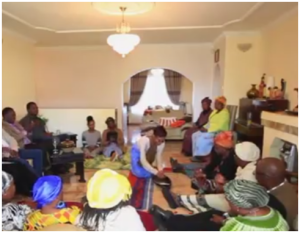
What is kunhonga?
-
- Kunhonga is when the bride picks money from the ndiro-plate during the roora process
- This is the only time the bride actively participates during the process
- The bride can
- accept the exact amount placed in the plate
- ask for more or pick less
Who else can participate in kunhonga?
-
- Bride can do it herself or delegate to any member of the core bride team. The bride can delegate the kunhonga to a
- sister
- female cousin
- or tete ( father’s paternal sister)
- Bride can do it herself or delegate to any member of the core bride team. The bride can delegate the kunhonga to a
Why is kunhonga necessary?
-
- It is the bride’s way of openly acknowledging the groom
What is the money used for?
-
- The bride uses this money to purchase basic personal household stuff for her home (e.g kitchen utensils, kitchen towels, bedding, bath towels etc.)
- The bride can also share the “picked amount” with her kindred womenfolk:
- sisters
- cousins, and in some instances tete (father’s paternal sisters)
Please note: In some families tete (bride’s paternal aunt) picks a fee for herself. This is because tete supposedly plays a role in training the niece to be an equipped wife, largely focusing on topics that biological mothers cannot freely discuss with their own daughters.
2. Dare-council
What is dare or “nhongo yedare”?
-
- Generally dare is a council (an advisory body of people). Traditionally, the men sat around fires to discuss family and community issues
- In this context dare is the group of “fathers”, vana baba
Who are these members?
It typically constitutes of
-
- biological father
- the father’s brothers
- father’s paternal male cousins
- the bride’s brothers
- bride’s paternal male cousins
What role do they play?
-
- The dare-council members consult, deliberate and sign off on all of the roora charges prior to and during the roora process
What is the dare or “nhongo yedare”fee?
-
- An amount charged and paid out to the dare members after the roora event, the dare fee is usually distributed among the dare-council members
- the money can also be used to purchase a goat to feed the roora gathering
Note: Instead of paying in cash, the dare-council can request the groom to bring a live goat
Step 3
1. Kutekenyandebvu
-
- Is the act of scratching or tickling the beard
What is matekenyandebvu?
-
- It is assumed that the bride as a child scratched and/or played with the father’s beard
- Matekenyandebvu is therefore a token fee of appreciation to the bride’s father for his role in the bride’s upbringing
- One of the steps among many, where the father is appreciated during the lobola ceremony
Please note: A father does not necessarily need to have grown a beard to receive the matekenyandebvu fee
2. Chiuchiro/Gusvi-Clapping
What is chiuchiro/gusvi?
-
- The act of clapping hands traditionally
- In the roora context, chiuchiro/gusvi is the token fee paid for the formal greeting during roora/lobola
- Please note, there maybe clapping during the ceremony, however gusvi is valued differently. Gusvi marks the official binding of both families
Outside of the roora gathering when is gusvi best suited?
-
- As a show of gratitude in some cases
- When greeting:
- The bride’s mother and father
- The bride’s brother’s wives
- The paternal cousin’s wives
- The bride’s brother
- The paternal male cousins
Please note: As a form of greeting chiuchiro/ gusvi can substitue the normal shaking of hands
Most Shona groups do not support or actively encourage the shaking of hands between
-
- The groom and the bride’s mother
- The bride’s brother’s wives
- The paternal cousin’s wives
Why is the shaking of hands not advised for the aforementioned relationships?
-
- To avoid undue familiarity with the bride’s mother
- To create a healthy barrier between the groom and bride’s brother’s wives, in order to avoid creating an environment that could encourage romantic relationships.
- To create a healthy barrier between the groom and bride’s paternal cousin’s wives, in order to avoid creating an environment that could encourage romantic relationships.
Step 4
1. Rusambo
What is rusambo?
-
- This is money paid to the father of the bride or whoever is playing the role of the father in the marriage process ( the biological father may be absent or he chooses to delegate the responsibility for many reasons)
- Rusambo is mandatory in the roora process
- It is the real roora
- Normally paid in cash
- Can also be in the form of livestock (e.g. cattle)
Why is rusambo important in the marriage process?
-
- It is the most important fee in the roora process
- It is a valued aspect of tradition
- If you do not meet this requirement , you have not married
What happens if you do not pay rusambo?
-
- Traditionally one would not be given his bride
- In some rare cases (during the roora process), the bride’s family may return all of the other bride price fees received to the son in law and ask him to come back more prepared
Please Note:
-
- That mandatory rusambo (bride price) is negotiable
- Can be paid in installments
However
-
- Considering the importance of rusambo, if the instalments are deferred for any reason (even death) the responsibility for honouring the rusambo payments falls on those who have responsibility to handle the matters. These could be
- surviving children
- groom’s father
- groom’s paternal uncles
- groom’s brothers
- groom’s paternal cousins
Remember, if the rusambo is not paid, you have not married
Unusual Circumstances
1.Bride’s families gather and the groom’s party does not show up
2.The roora negotiations begin and families vehemently disagree resulting in disbanding the proceedings
